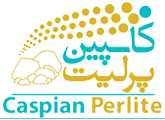green roofs
Perlite for green roof and green roof technology
Green Roof Technology
So-called “Green Roofs” are being built more and more throughout the world, especially in Germany. They are used on both commercial/industrial buildings and residential homes.
According to Dr. Edgar David, an Associate Professor of Landscape Architecture at Temple University/Ambler, “green roofs mimic the natural processes that the buildings replace. It is a new and exciting technology that has the ability to improve our air quality and water quality.”
The roofs also save energy cost by providing much better insulation, and last much longer than traditional roofs that degrade and deteriorate due to exposure to ultraviolet sunlight and heat. Dr.David has suggested that typical green roofs can last “two or three times longer than traditional roof systems.”
So-called “Green Roofs” are being built more and more throughout the world, especially in Germany. They are used on both commercial/industrial buildings and residential homes.
According to Dr. Edgar David, an Associate Professor of Landscape Architecture at Temple University/Ambler, “green roofs mimic the natural processes that the buildings replace. It is a new and exciting technology that has the ability to improve our air quality and water quality.”
The roofs also save energy cost by providing much better insulation, and last much longer than traditional roofs that degrade and deteriorate due to exposure to ultraviolet sunlight and heat. Dr.David has suggested that typical green roofs can last “two or three times longer than traditional roof systems.”
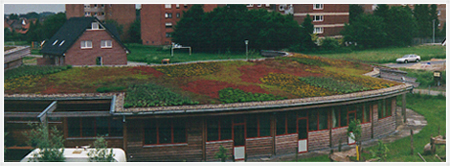
A office/school complex with a green roof
In some German cities, green roofs are being encouraged by tax incentives and regulation. And in some cities, like Stuttgart, the use of green roofs is practically mandated in some construction.
According to Fritz Hammerle of Arti-Grün (located near Stuttgart), green roofs have developed for a number of reasons:
• Water Retention and Stormwater Issues
With many non-impervious surfaces or developed areas with 5% or less of impervious area, 90% of the water from a storm will run off within 9 minutes. With green roofs, only 30% of the water will run off within 2 hours. As a result of increased development in many areas along the Rhine River, for instance, Köln has had three 100-year floods within ten years!
• Visual and Environmental Improvements
Roof gardens and green roofs have proven to be visually appealing and desirable – especially in urban areas where there is less and less open space available or visible. With green roofs (in Germany pesticides and insecticides cannot be used on green roofs, and fertilizer is used sparingly,) the amount of pollution from stormwater run-off has been significantly reduced.
• Energy Savings
Green roofs have proven to save heating costs in the winter and cooling costs in the summer. They also reduce the amount of stormwater that has to be processed in stormwater systems and municipal waste water operations.
As a result of these and many other concerns, Germany has seen a significant growth in green roofs. In 1994 only 11% of all flat roofs (roofs with a slope of 5% or less) were being built as “green roofs” – in 2001 the number has increased to 14%!
In some German cities, green roofs are being encouraged by tax incentives and regulation. And in some cities, like Stuttgart, the use of green roofs is practically mandated in some construction.
According to Fritz Hammerle of Arti-Grün (located near Stuttgart), green roofs have developed for a number of reasons:
• Water Retention and Stormwater Issues
With many non-impervious surfaces or developed areas with 5% or less of impervious area, 90% of the water from a storm will run off within 9 minutes. With green roofs, only 30% of the water will run off within 2 hours. As a result of increased development in many areas along the Rhine River, for instance, Köln has had three 100-year floods within ten years!
• Visual and Environmental Improvements
Roof gardens and green roofs have proven to be visually appealing and desirable – especially in urban areas where there is less and less open space available or visible. With green roofs (in Germany pesticides and insecticides cannot be used on green roofs, and fertilizer is used sparingly,) the amount of pollution from stormwater run-off has been significantly reduced.
• Energy Savings
Green roofs have proven to save heating costs in the winter and cooling costs in the summer. They also reduce the amount of stormwater that has to be processed in stormwater systems and municipal waste water operations.
As a result of these and many other concerns, Germany has seen a significant growth in green roofs. In 1994 only 11% of all flat roofs (roofs with a slope of 5% or less) were being built as “green roofs” – in 2001 the number has increased to 14%!
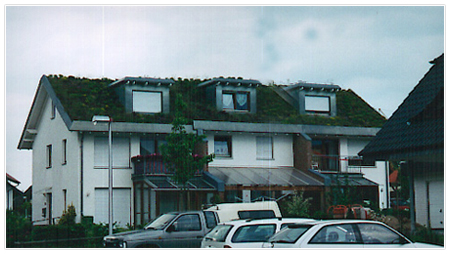
A three family German home
A three family German home
Read more about green roofs
To read more about green roofs, which use lightweight mixes using perlite for water retention, proper drainage, and light weighting – there are a number of interesting sites.
For more information about the use of perlite in green roofs, here are some links:
- Green Building Starts at the Top E. Daniels – an excellent article by
- Green Roofs.Com non-commercial sites – with links to both commercial and
- A Link To Roofscapes, Inc (Charles Miller)
- http://www.greenroofs.com/archives/gf_may06.htm
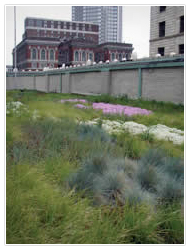
Roof of Heinz 57 Center in Pittsburgh, PA
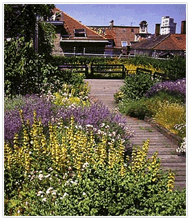
Picture Supplied by Roofscapes, Inc.

